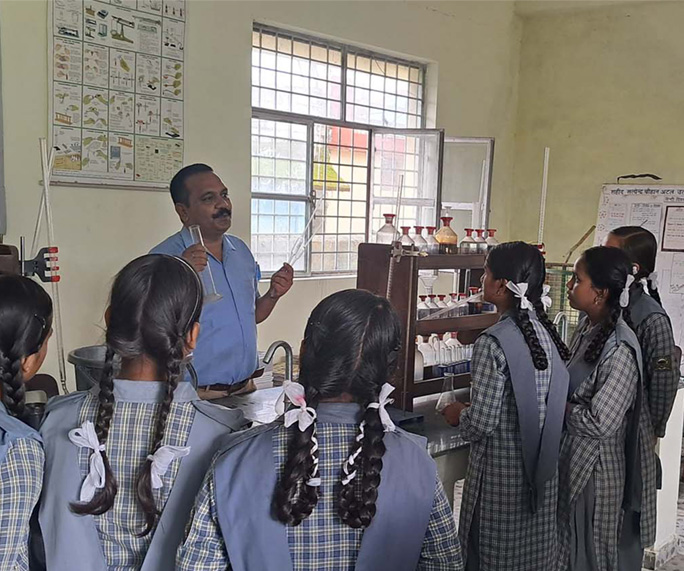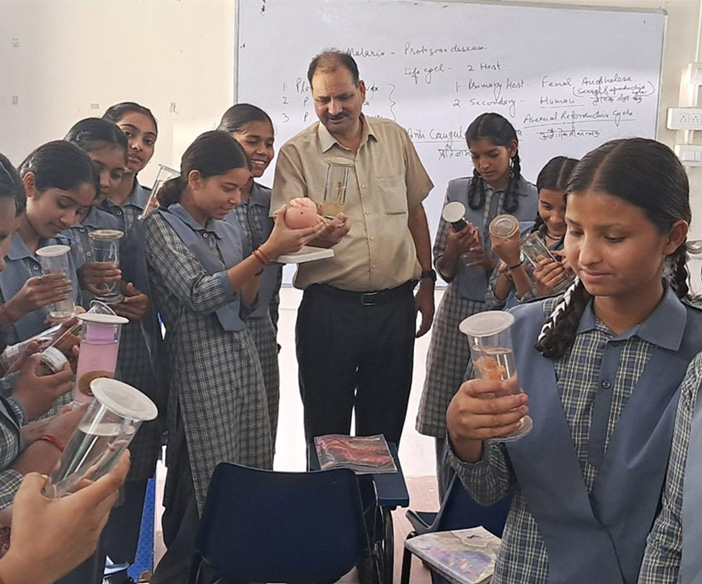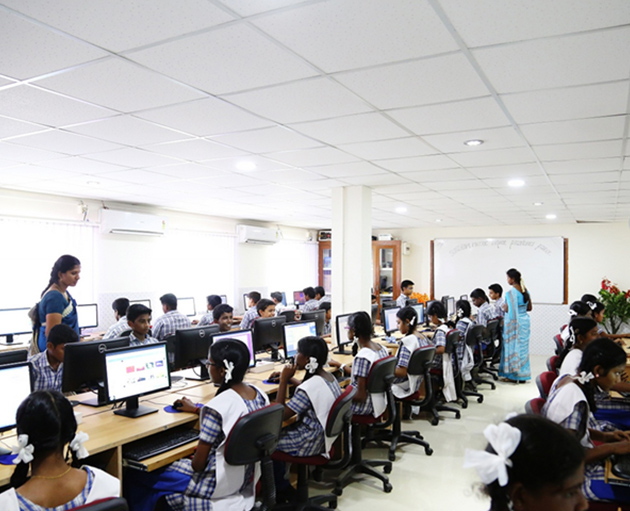Our Facilities
Science Labs
Physics Labs
Physics labs in schools are dedicated spaces designed to help students explore and understand the principles of physics through practical experiments and hands-on activities. These labs provide an interactive learning environment where students can apply theoretical concepts and observe physical phenomena firsthand.
- Equipment: Vernier calipers, lenses, pulleys, and circuit components for hands-on learning in mechanics, optics, and electromagnetism.
- Apparatus: Tools like spring scales and oscilloscopes for measuring forces and studying electrical signals.
- Safety: Safety goggles, lab coats, fire extinguishers, and first aid kits ensure a safe learning environment.


Chemistry lab
Chemistry labs in schools are designed to facilitate hands-on learning of chemical principles and experiments. These labs are equipped with various tools and safety measures to support a wide range of chemical investigations.
- Glassware: Beakers, flasks, test tubes, and graduated cylinders for mixing, measuring, and heating substances.
- Heating Devices: Bunsen burners, hot plates, and water baths for heating chemical solutions and conducting reactions.
- Measuring Instruments: Balance scales for accurate measurement of chemicals, and pH meters for testing acidity and basicity.
- Chemical Storage: Cabinets for safely storing chemicals, including acids, bases, and solvents.
- Safety Equipment: Fume hoods for ventilating hazardous fumes, safety goggles, gloves, and lab coats to protect against spills and exposure.
Biology lab
Biology labs in schools are designed to support the study of living organisms and biological processes through hands-on experiments and observations. These labs are equipped with tools and resources that facilitate practical learning in various areas of biology.
- Microscopes: Light microscopes and stereo microscopes for observing cells, tissues, and microorganisms in detail.
- Specimen Preparation: Slides, coverslips, and staining materials for preparing and viewing biological samples.
- Dissection Tools: Scalpels, tweezers, and probes for examining and dissecting specimens to study anatomy and physiological functions.
- Growth Chambers: Incubators and controlled environment chambers for cultivating cultures and studying growth and development.
- Genetics Tools: PCR machines, gel electrophoresis equipment, and centrifuges for molecular biology experiments.


Computer Lab
The Computer Lab is here to support your educational journey, offering a quiet and resource-rich environment for learning, exploring, and creating. Make the most of this space to enhance your digital literacy and achieve academic success.
Facilities and Equipment
- Computers: Each workstation is equipped with modern computers featuring the latest operating systems and essential software, including word processors, spreadsheets, presentation tools, and educational programs.
- Internet Access: High-speed internet is available to facilitate research, access to online educational resources, and safe browsing.
- Printers and Scanners: The lab is equipped with printers and scanners, allowing students to print out assignments and scan important documents for digital use.
School Library
The school library is a dynamic space offering a diverse collection of books, magazines, and digital media to support various academic subjects and personal interests. It features print resources, e-books, online databases, and computers for research and assignments.
With comfortable seating, study areas, and librarian support, the library provides a quiet environment for focused study and collaboration. It also hosts reading programs and activities to foster a love of reading and lifelong learning. The library’s inviting atmosphere and wide range of resources make it an essential part of the school experience, encouraging both academic success and personal growth.


NCC/NSS
In secondary schools, the National Cadet Corps (NCC) offers students the chance to develop leadership, discipline, and teamwork skills through structured training and activities. NCC cadets participate in drill exercises, physical training, and basic military skills, along with community service projects. The program also includes camps and adventure activities that enhance personal growth and foster a sense of national pride.
The National Service Scheme (NSS) in secondary schools engages students in community service and social outreach activities. NSS volunteers work on projects such as environmental clean-ups, health campaigns, and educational support for underprivileged communities. By participating in these initiatives, students gain valuable experience in social responsibility, develop empathy, and contribute to the betterment of their communities.
Mid-Day Meal
The Mid-Day Meal program in secondary schools provides students with a nutritious meal during the school day, aiming to improve their health, enhance their learning experience, and encourage regular school attendance. This program ensures that students receive a balanced diet that supports their physical and mental development, with meals typically including a combination of rice, vegetables, pulses, and sometimes fruits or dairy products.
The program helps reduce dropout rates by addressing food insecurity among students. By providing a reliable source of nutrition, it supports both academic success and overall well-being.

